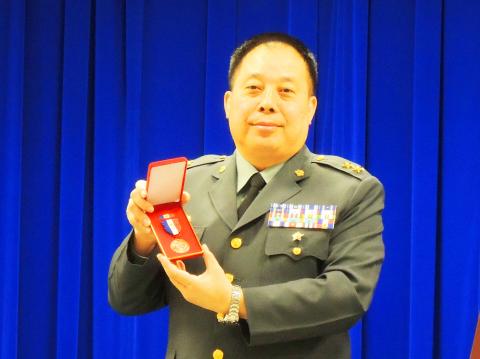The Ministry of National Defense yesterday said it would issue commemorative medals in honor of veterans who fought the communists during the Cold War era, adding that the timing of the honors has nothing to do with Saturday’s presidential and legislative elections.
President Ma Ying-jeou (馬英九) is to host public ceremonies later this month to present the first issue of the “Safeguard Taiwan Commemorative Medallion” to the recipients, or their dependents, in the case of deceased soldiers, the ministry said.
Assistant head of the ministry’s personnel department Major General Hsu Yen-pu (徐衍璞) said that about 12,000 veterans would be eligible — those who were wounded, captured by Chinese troops, sacrificed their life or displayed valor during battles in Cold War years.

Photo: Lo Tien-pin, Taipei Times
In response to media queries on announcing the awarding of the new medals just four days before the elections, Hsu said: “There is no political consideration in this, and the armed forces abide by principle of administrative neutrality. It has nothing to do with the upcoming elections.”
However, opposition legislators and critics were not convinced, saying the move was to sway voters toward the Chinese Nationalist Party (KMT) in many closely fought legislative races.
“We are very suspicious of the motives behind this move. There are only four days to the elections, but the government and the military chose this time to announce this major initiative,” Democratic Progressive Party Legislator Tsai Huang-liang (蔡煌瑯) said.
“This timing is an obvious attempt to influence the elections by granting favors to veterans and their families. The ruling party is trying to shore up its base among military personnel dependents and traditional pan-blue camp supporters by appealing to patriotism and flag waving,” said Tsai, who is a member of the legislature’s Foreign Affairs and National Defense Committee.
He said that the initiative should not be undertaken at such a sensitive time, as the decision should be left to the legislators who are elected in the upcoming polls.
Other critics said the move was Ma’s effort to consolidate support for the KMT, as this election campaign has seen pan-blue constituencies wracked by dissent and their votes splintered to support the People First Party, New Party, Republican Party and other upstart groups.
The ministry said that in addition to Taiwanese veterans, about 126 Americans and their dependants are also eligible, because US soldiers were killed or wounded in artillery battles at Kinmen, Matsu and other front-line islands, during what were known as the First and Second Taiwan Strait Crises between 1954 and 1958.

CHAOS: Iranians took to the streets playing celebratory music after reports of Khamenei’s death on Saturday, while mourners also gathered in Tehran yesterday Iranian Supreme Leader Ayatollah Ali Khamenei was killed in a major attack on Iran launched by Israel and the US, throwing the future of the Islamic republic into doubt and raising the risk of regional instability. Iranian state television and the state-run IRNA news agency announced the 86-year-old’s death early yesterday. US President Donald Trump said it gave Iranians their “greatest chance” to “take back” their country. The announcements came after a joint US and Israeli aerial bombardment that targeted Iranian military and governmental sites. Trump said the “heavy and pinpoint bombing” would continue through the week or as long

TRUST: The KMT said it respected the US’ timing and considerations, and hoped it would continue to honor its commitments to helping Taiwan bolster its defenses and deterrence US President Donald Trump is delaying a multibillion-dollar arms sale to Taiwan to ensure his visit to Beijing is successful, a New York Times report said. The weapons sales package has stalled in the US Department of State, the report said, citing US officials it did not identify. The White House has told agencies not to push forward ahead of Trump’s meeting with Chinese President Xi Jinping (習近平), it said. The two last month held a phone call to discuss trade and geopolitical flashpoints ahead of the summit. Xi raised the Taiwan issue and urged the US to handle arms sales to

BIG SPENDERS: Foreign investors bought the most Taiwan equities since 2005, signaling confidence that an AI boom would continue to benefit chipmakers Taiwan Semiconductor Manufacturing Co’s (TSMC, 台積電) market capitalization swelled to US$2 trillion for the first time following a 4.25 percent rally in its American depositary receipts (ADR) overnight, putting the world’s biggest contract chipmaker sixth on the list of the world’s biggest companies by market capitalization, just behind Amazon.com Inc. The site CompaniesMarketcap.com ranked TSMC ahead of Saudi Aramco and Meta Platforms Inc. The Taiwanese company’s ADRs on Tuesday surged to US$385.75 on the New York Stock Exchange, as strong demand for artificial intelligence (AI) applications led to chip supply constraints and boost revenue growth to record-breaking levels. Each TSMC ADR represents

State-run CPC Corp, Taiwan (CPC, 台灣中油) yesterday said that it had confirmed on Saturday night with its liquefied natural gas (LNG) and crude oil suppliers that shipments are proceeding as scheduled and that domestic supplies remain unaffected. The CPC yesterday announced the gasoline and diesel prices will rise by NT$0.2 and NT$0.4 per liter, respectively, starting Monday, citing Middle East tensions and blizzards in the eastern United States. CPC also iterated it has been reducing the proportion of crude oil imports from the Middle East and diversifying its supply sources in the past few years in response to geopolitical risks, expanding